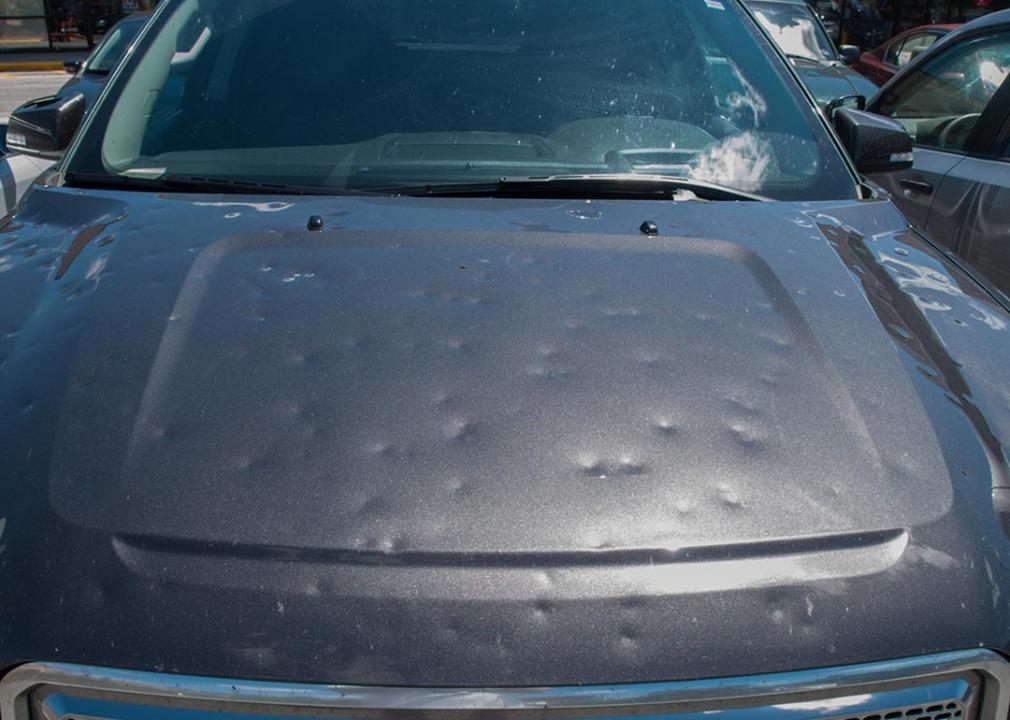Christian Delbert // Shutterstock Severe weather can seriously damage your car, and one of the most damaging weather events is hail. There were over 3,700 hail storms in the U.S. in 2021, which caused billions of dollars’ worth of damage. That said, if your car has been damaged by hail, you may be wondering what to do next. In this article, Cheap Insurance takes a look at when you may or may not be covered for hail damage and explores the information you need to make a claim. Where is hail most prevalent in the United States? Texas is the state where hail storms are the most common. This means that Texas drivers are more likely to file an insurance claim for hail damage than in any other state. The top ten states for hail damage insurance claims between 2018 and 2020 include: Texas Colorado Illinois Missouri Minnesota Kansas Nebraska Iowa Oklahoma South Dakota When does my car insurance policy cover hail damage? Not all car insurance policies cover hail damage. In order for you to have your car repairs covered by insurance after a hailstorm, you will need comprehensive coverage. This is the only car insurance that will cover hail damage. If you only have liability insurance, your auto insurance company will not cover any damage to your car from hail. Comprehensive insurance coverage helps pay to repair or replace your vehicle if it is damaged in an accident that is not a collision. When you carry comprehensive coverage, you will be covered for storm damage, animal damage, and falling objects–including hail. Hail damage will result in dents on the bodywork of your vehicle and even a cracked or smashed windshield or window. Hail may also cause water damage to the interior of your car. Liability insurance is intended to cover other drivers and their passengers in the event of a collision. This coverage includes damage to the other vehicle and the medical costs of the other driver and passengers. Liability insurance coverage does not cover damages to your car in an accident, but it does provide a lower auto insurance cost. To have your own vehicle repaired after a collision, you will either need comprehensive insurance or you will need to pay out of pocket for damages. Is It necessary to pay a deductible for hail damage? Car insurance policies usually establish a deductible. This is the amount of money that you need to pay when you make an insurance claim. For example, if it is going to cost $5,000 to repair hail damage and you have a deductible of $500, your insurance company will pay $4,500 toward the repair costs, while you will need to pay $500. Having a higher deductible on your insurance policy will help lower your car insurance premium. If you, however, live in an area where hailstorms occur often, then you may want to consider whether you’ll have the savings needed to pay that higher deductible. There are certain circumstances where your insurance adjuster may waive the deductible on the glass portion of your comprehensive coverage. For example, if your windshield can be repaired rather than replaced, then your insurer may waive the deductible that you usually would have had to pay. In addition to this, it is helpful to know that you can purchase full glass coverage as part of your auto insurance policy. This typically means that you will not have to pay a deductible on glass claims. What is full glass coverage and why is it useful? Full glass coverage on your auto insurance policy provides you with insurance coverage to get a windshield or other vehicle glass fixed, without paying a deductible. Full glass coverage includes: Windshields Windows Rear windows The types of repairs that can be done range from chipped, cracked, or broken glass. This coverage also allows for your windows or windscreen to be replaced if and when necessary. Will filing an insurance claim after a hail storm impact my car insurance premium? If you do need to make an insurance claim for hail damage to your vehicle, that claim may appear on your insurance record. This means that when your insurance company reviews your claim history prior to renewing your car insurance policy for a new term, they may increase your premium if you have filed claims over the last year. If you live in an area where hail damage is likely to occur, it is a good idea to keep your car safe by parking it in a covered parking lot or in a garage. This will help reduce the chance that your insurance premium might increase, allowing you to maintain a more affordable auto insurance policy. How do you file a claim for hail damage to your car? If you have comprehensive coverage, be sure to contact your insurance company as soon as possible after the damage has occurred. 1. Document the damage to your car Take photos of all the hail damage that your vehicle has sustained. This will help you when you need to provide proof of the incident to your insurer when making a hail damage claim. Some insurance adjusters may not accurately assess the extent of the hail damage, and this leads to a lower, inaccurate repair estimate. 2. File a comprehensive insurance claim Contact your insurance company to file a claim. Each car insurance company works slightly differently when it comes to processing a claim. Your vehicle insurance adjuster will guide you through the process. 3. Get an estimate from a car repair shop To ensure that you get your car repair costs covered by your insurance company, it is best to make sure that you have an idea of how much it is going to cost to repair your vehicle. This guarantees that your insurer will pay out the right amount of money to repair the vehicle, and it also helps you decide whether you should claim or pay for the repairs out of pocket. 4. Choose a reputable repair shop Once you have finalized your car insurance claim with your insurer, look for the most suitable body shop to repair your vehicle. Some auto insurance companies may write you a check for the expected cost of the repairs, minus your deductible, while other companies may wait and reimburse the body repair shop directly. 5. Schedule the hail damage repair Once the car insurance claim has been finalized, take your car in for repairs. Your car insurance company may recommend paintless dent removal, which is a quick, simple repair option. Alternatively, if the damage to your car is extensive, you will need to wait up to a few weeks for your car repair shop to complete your repairs. This is especially true if the repair shop is busy. If you have rental car insurance as part of your car insurance coverage, you will be able to rent a car for the time that your vehicle is in for repairs. Is hail damage repairable? Hail damage is repairable if the damage has not impacted the structural integrity of the vehicle. If the hail damage to your car is not too severe, then it can be repaired using a process called paintless dent removal. During this process, the dented areas are gently pushed back to their original position. Other repair methods that involve traditional bodywork are more expensive and time-consuming. Here you can expect the body shop to fill and repair dents or replace damaged panels.
When does car insurance cover hail damage?








